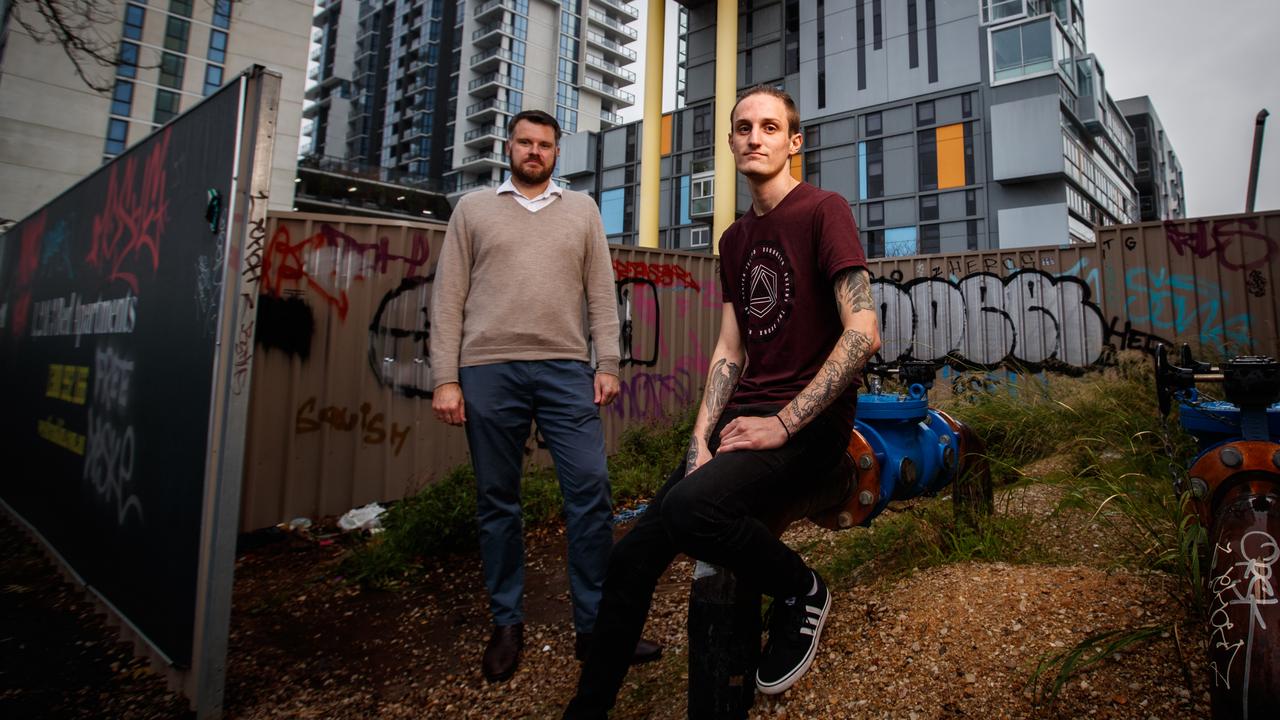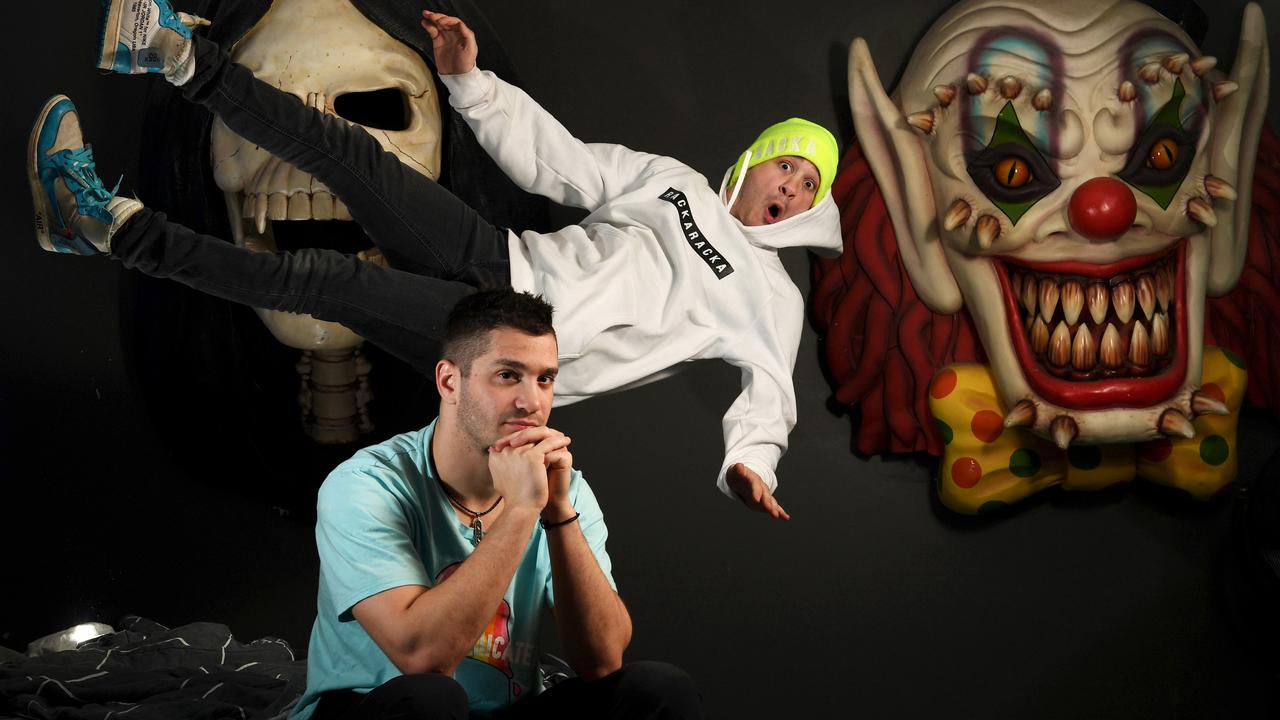Andrew Fagan talks about life as CEO of the Crows
HE grew up playing rugby league, then ran Canberra’s rugby union team. But when Andrew Fagan switched to AFL to be boss of the Crows, he couldn’t have predicted the challenges ahead.
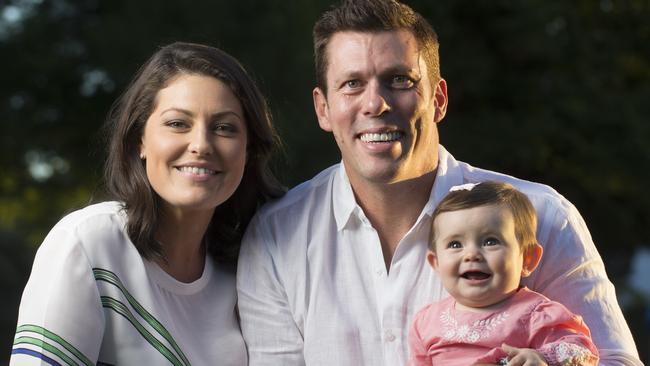
SA Weekend
Don't miss out on the headlines from SA Weekend. Followed categories will be added to My News.
ANDREW Fagan halts mid-sentence as he recalls the days following the death of Adelaide coach Phil Walsh last July. He is remembering the thousands who gathered just below his first floor office at Crows’ headquarters to leave a tribute — a footy, maybe an old jumper, a note — to mourn the loss of a man most of them had never met.
“I just got tingles speaking about it,’’ he confesses. To Fagan, the reaction to Walsh’s tragic killing was an indication of just how deep the roots of football run in society and the power of a football team to bury itself deep in the hearts of supporters. Even in the worst possible circumstances.
“Everyone wrapped their arms around everyone and it happened immediately. That doesn’t happen in life very often,’’ he says, suddenly caught back up in the emotion of that moment. Then he collects himself and continues.
“The procession of people who came here and cried openly, sobbed openly, while laying their flowers and saying a few words. It was genuine and it was heartfelt and it hurt a lot of people.’’
Fagan was still a newcomer to Adelaide when he was plunged into the greatest crisis and tragedy the Crows had experienced in their 25 years in the AFL. Now with his second season as Adelaide chief executive under way — and as his team prepares to meet Port Adelaide in front of more than 50,000 supporters at the Adelaide Oval today — the 44-year-old Fagan can reflect on that traumatic time and believe, and hope, that something positive can emerge from it.
The sense of loss is still with him. It’s a situation that he has now had to deal with twice. When he was chief executive of rugby union club the Brumbies in Canberra a player, Shawn Mackay, was killed in a car accident while the team was in South Africa.
“People talk about shock and that shock is a moment in time. I reckon it’s not just a moment in time,’’ he says. “I don’t think I will ever move through the shock of it. It’s something that is so confronting, it’s less about moving through, its more about just accepting that it’s happened and dealing with that.’’
It has fallen to Fagan to guide the club and build not only on Walsh’s legacy, but to take something from that moment of tragedy and bind it into the culture of the club. It’s fascinating that such a task should fall to an outsider.
Fagan is only the third to hold the chief executive’s office at the Crows since the club started in 1991 — following Bill Sanders and Steven Trigg — and is the first non-South Australian in the role.
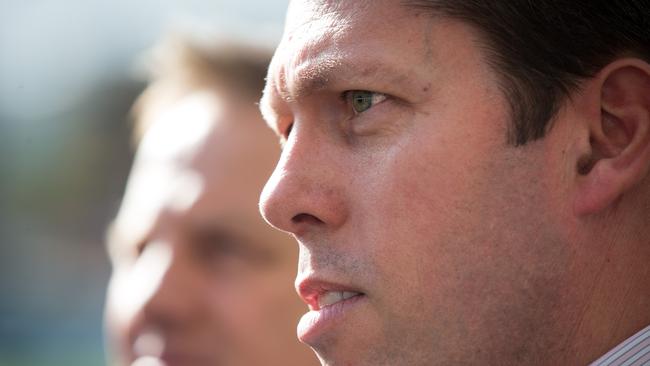
It’s one reason the Adelaide Football Club has always been seen as something of a “boy’s club”, although Fagan rejects that perception by pointing to his own “left-field appointment’’ as proof it’s not a closed-door culture.
Funnily enough, Fagan was born in Adelaide. But to call him a South Australian would be stretching the definition. He left town before he had turned two when father Russell and English-born mum Jacqueline moved first to Victoria and then to Ourimbah, on the central coast of New South Wales, the family’s traditional stomping ground.
His dad was a salesman working mainly in the pool and spa industry who, while in Adelaide, operated a pool shop on Fullarton Rd not far from the Arkaba Hotel.
It was a childhood marked by constant movement. After settling in at Ourimbah Public School, the family moved to Sydney where he studied at St Ives primary and high schools before returning to the Central Coast in Year 10.
Fagan wasn’t keen on all the disruption — “I didn’t like the thought of moving and leaving my friends’’ – but his love of sport always helped him settle into his new surrounds. “You become part of a team straight away and that brings with it friendships that are unique,’’ he says.
He was a talented junior athlete. At the age of 12 he was ranked third in Australia for high jump and was a keen rugby league player, but a succession of injuries in his mid-teens curtailed his progress. You can still see the outline of that younger Fagan today.
In his league days he played full back and five-eighth, so still retains his neck and ears, unlike many rugby players. He is taller than you might expect but if he had played Aussie rules you could see him as a long-striding wingman.
The idea of pursuing sport as a career outside of the playing field hadn’t occurred to him as a kid. He was doing well at school but wasn’t sure what he wanted to do next. He thought he could become a lawyer; he even flirted with the idea of joining the armed forces until he discovered he was colour blind.
When school days finished he won a scholarship with a bank to join its management program. It was a program which would also pay his way through university as he studied his business degree.
But after a year he pulled out. “I realised that wasn’t going to be my passion,’’ he says.
I t was not until he was sitting in his flat in Sydney and one of his mates brought home a university admissions guide that he had an inkling of what the next step could be.
“I grabbed it off him one day, having a beer, and I opened it to the University of Canberra and their sports journalism degree,’’ he remembers. “It’s a moment of my life I recall with absolute clarity and it was like a siren sounding. That’s me, that’s what I want to do. I want to go and work in sport.’’
So within days he had submitted his application and was heading to Canberra. But with a little more reflection he changed from journalism to a sport management degree.
His father was not too pleased. “He couldn’t contemplate you could get a job that would actually pay you any money. He thought I’d lost my mind.’’ And you could see his point.
This was 1989. The sport landscape was vastly different. And smaller. There was no A-League, no Big Bash, no Super Rugby, not even any Adelaide Crows or Port Adelaide. The University of Canberra was one of the few institutions to offer a sport management degree. Now they proliferate everywhere.
It was what Fagan calls his “sliding doors’’ moment. “We all need a bit of fate from time to time,’’ he says.
He uses the same “sliding doors’’ analogy to describe his path to the Crows. He had been chief executive at the Brumbies for a decade and was looking for a change. Rugby is an international sport but the Brumbies’ annual revenue is less than half that generated by the Crows.
Peter McGrath has long been a powerbroker in Australian rugby. He has served as chairman to both the Australian Rugby Union and the Brumbies. It was McGrath who was so impressed by the young Fagan, who was then working at the Australian Sport Commission, that when they met at a lunch he immediately recommended him to the Brumbies.
“He’s intelligent, he’s articulate,’’ he says. “I just saw him as a young man with a lot of potential and I would like to say I was right.’’
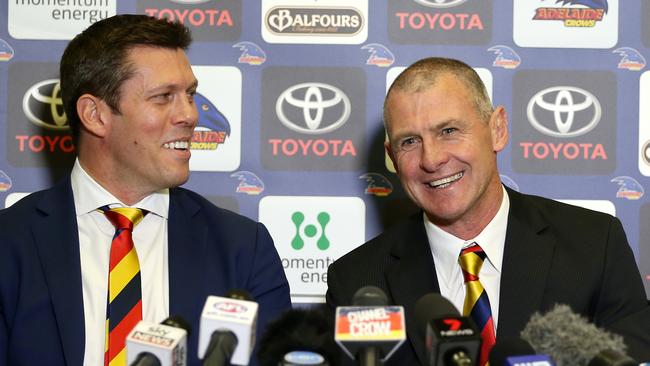
McGrath talks of Fagan’s ability to understand the business of sport and his capacity to communicate to people like sponsors. But he nominates another factor. “One of his strengths is that he doesn’t sleep,’’ he says with a laugh. “He’s got an enormous amount of energy.’’
When the time came for Fagan to leave the Brumbies in 2013 he moved to Sydney to take a job at Australian Rugby Union headquarters. Yet, he is still not quite free of the Brumbies with ACT police investigating a land deal that occurred under his watch. But Fagan has heard nothing from police, saying “it is close to two and half years since I left the club, I haven’t been contacted about the issues they are working through and don’t expect to be’’.
But his stay at rugby HQ was to be cut short.
Fagan says he wasn’t looking to move — he and partner Alana Smith had bought a house in Sydney — but received a phone call from a mate alerting him to the vacancy at the Crows.
He was aware the Crows were looking but hadn’t given it a lot of thought. Because of his birthplace, Fagan had always seen the Crows as his second team in the AFL, after the Sydney Swans, but the call made him think harder about the possibility.
Still, it was a couple of weeks before he did anything about it. In that time he also asked Smith, who was a newsreader at Fox Sports News, if she was up for a move to South Australia.
“‘It’s a big move and I am not even going to make the phone call unless you say if successful you’d go’,’’ is what he said. “I said ‘the answer no is fine’.’’ But Smith said she was keen for a change as well.
Yet he didn’t rush to pick up the phone and apply. He wanted to do his research into the football club before committing himself to the emotionally arduous task of chasing a new job.
“You have to make sure the environment is going to be right, the opportunity is going to be right, the club is going to be right, the board is going to be right, the future challenge is one you want to take on.’’
Eventually, he decided it was and made the phone call. One of the attractions was the amount of change the club had been through.
It had been a tempestuous few years for Adelaide. It had been through the ignominy of the secret Kurt Tippett trade deal, when the Crows tried to circumvent AFL rules, costing then chief executive Steven Trigg a six-month ban, the club a $300,000 fine, and restrictions placed on future drafts.
On the brighter side, the club — after years of protest — made the highly successful move to Adelaide Oval and had strengthened its hold on its own future by buying back its licence from the AFL. “Once in a lifetime — once in a generation — events had taken place,’’ he says.
Fagan was to be one of 110 applicants for the position but he says his desire to win the job by then had become a “compulsion”.
Adelaide chairman Rob Chapman confirms “we weren’t short of candidates’’ but says Fagan was the “outstanding’’ one.
“The fresh set of eyes became important to us,’’ Chapman says. “Bringing someone from outside who had no baggage, no history, we saw as a genuine positive.’’ Chapman nominates appointing Fagan was one of the “best three or four decisions’’ made in his time as chairman and believes he is already one of the leading executives in the AFL.
“He has been an exceptional chief executive through what has been unprecedented challenges in any football club of any code and led our club admirably.’’
Fagan probably knew early on he was in for a hectic ride.
The day after he turned up to start his new job, the club sacked its coach Brenton Sanderson. Strangely, Sanderson was the only bloke Fagan knew at the Crows, having met him through Smith when she was at Fox Sports. Sanderson had even given some advice to Fagan about the Crows when he applying for the job.
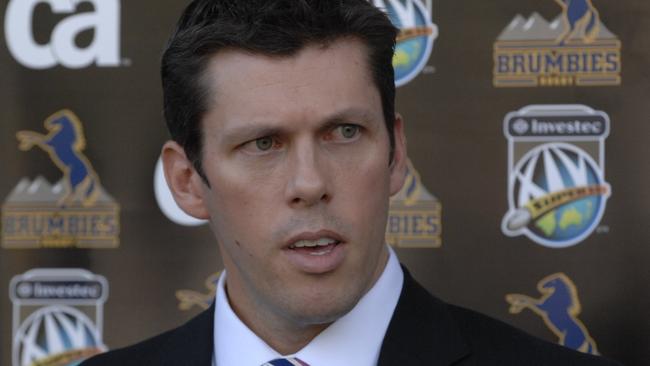
Fagan also had to become used to the overwhelming footy hype in Adelaide. Certainly, the Brumbies were the only rugby team in Canberra, and that brought its own sense of focus, but South Australia was something else.
“It’s an environment of pressure and scrutiny that is unlike almost anything else other than politics,’’ he says. The amount of knowledge carried by supporters about their team was also something that surprised Fagan. In other cities, he says, supporters would struggle to list the “starting 15 or 18 or 22’’.
Not here. “In South Australia, it’s like ‘I will give you the 45 players on your list, I will tell you who you traded in, I will give you the history of the draftees, I will give you my top 20 players of all time by position’. It’s extraordinary and you don’t see it many places.’’
Fagan though is enjoying the pressure and scrutiny. But he does admit it may be something that affects the players in different ways.
It’s almost 20 years since Adelaide won the second of its two premierships. Given the resources and the quality of players through West Lakes since 1998, there’s no doubt the club has underperformed.
It’s never an exact science but there is a thread of thought that says living in the Adelaide goldfish bowl, a place where hero status is granted before a goal has been kicked, can breed a certain sense of comfort.
It’s a theory Fagan, as the outsider, is prepared to entertain. “When you exist in a city and a state that is so parochial, where the scrutiny is so significant and the passion runs so deep that maybe it’s hard to be consistent,’’ he muses.
“If you play a few good games, you are a Brownlow Medal favourite. If you win a few games we are a flag favourite. If you lose a few games, people have to go.
“Maybe you become complacent at the top end and maybe you react at the bottom end.’’
But Fagan is adapting and planning a long-term stay at the club. He and Smith had their first child, Giselle, last year, and are now planning to get married. Fagan also has two daughters from a previous marriage — Jade, who is seven, and Ivy, five — who live with their mother Bronwyn in Canberra. Fagan says he sees them every two weeks, often diverting through Canberra on the way to and from interstate trips. They have also become Crows fans.
He says he is well settled in Adelaide and deflects the suggestion made by ARU boss Bill Pulver that he will one day return to run rugby.
“I am sitting here staring at the next decade, thinking how wonderful can we make this experience and what can this club become and what can we all achieve together and what role can I play in leading it.’’
Smith is happy as well. She co-hosts The Crows Show on Seven, as well as presenting the weather on the same network, and will be working on the station’s SANFL coverage this year as a boundary rider.
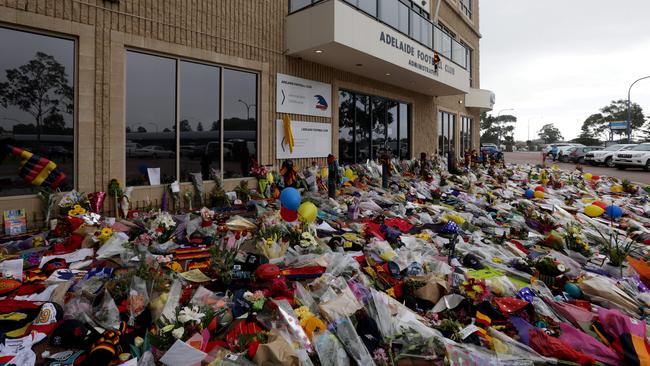
The pair met three years ago at a sporting lunch and Smith says both of them like to fall into the couch and watch television to relax. They are currently watching series four of the political series House of Cards, but Smith says Fagan has broad, if not necessarily good, tastes in TV.
“He will watch anything,’’ she says. “He will jump from Q&A to Keeping Up with The Kardashians and be happy.’’
Smith also marvels at how well Fagan coped in the aftermath of last year’s devastation.
“I still really don’t know how he did it,’’ she says. “He put on a bit of a brave face and got through it, but then there were just times I found him in tears.’’
The events of July 3 last year will be forever marked in the history of the Adelaide Football Club.
As Fagan notes, the shock of such a terrible event never really leaves you. But what will also never leave the Crows’ chief executive is the memory of the days that followed — and how a football club and the broader football community pulled together to grieve and to mourn.
“I look at the reaction and I will forever be inspired by it,’’ he says.
But more than that, Fagan believes the reaction to Walsh’s death can be a turning point for the Adelaide Football Club.
That the emotion generated in those dark times that brought so many people together in solidarity can be used in a positive way to build something new. Something that not only honours Phil Walsh and his memory, but that can change the mentality of an entire football club.
“Sometimes there are moments that just occur that are transformational,” he says. “It’s a key shift in the history of the club and I think that is one of those.
“More broadly, it became the time at which that club evolved into a club with a history that was now front and centre, and a culture that was strong and bold, and passion was overt and real — and something that was extraordinary.’’

